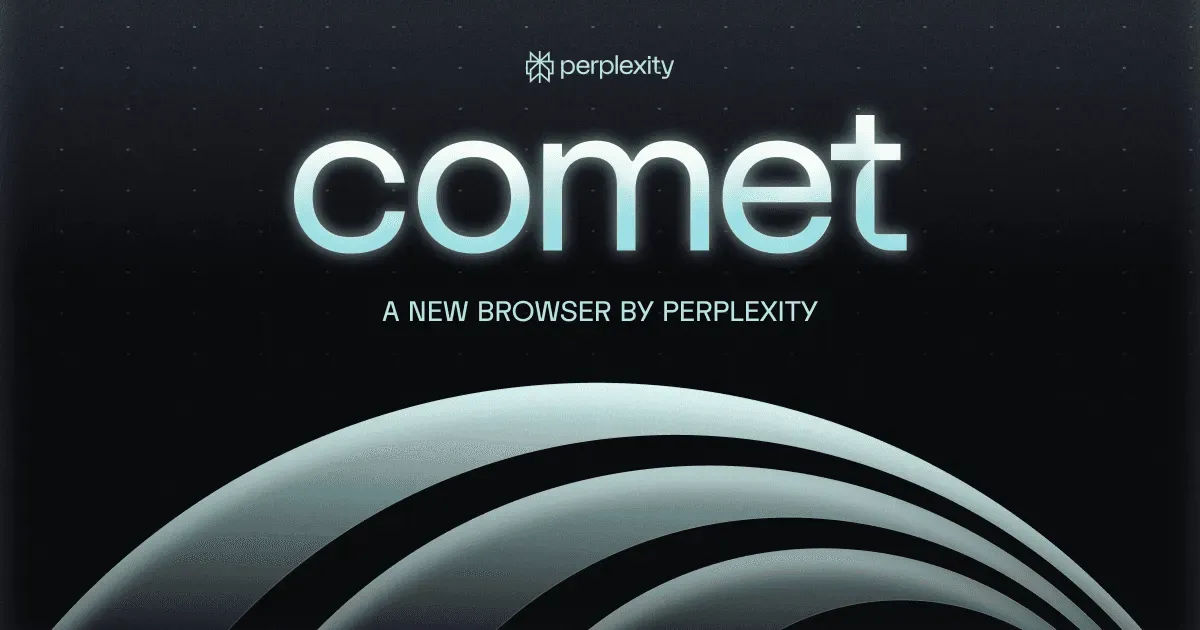Comet is an upcoming agentic AI browser developed by Perplexity, a company already known for its innovative approach to search products. At the time of writing, Comet is only available to a select group of early testers, and TestingCatalog had the opportunity to put it through its paces. Here’s a comprehensive look at what makes Comet unique, its standout features, and why it might just change how you interact with the web.
BREAKING 🚨: Perplexity started rolling out its agentic web browser - Comet to early testers.
— TestingCatalog News 🗞 (@testingcatalog) May 20, 2025
Vibe browsing is almost here 👀 https://t.co/Ahx9Hs9er6 pic.twitter.com/UmFARUN6yx
Familiar Chromium foundations
Comet is based on Chromium, which ensures instant familiarity for most users—everything from the core browsing experience to extension compatibility feels right at home. For anyone considering switching browsers, this alone removes much of the friction. Native support for extensions means you’re not leaving your favorite add-ons behind, and there’s a particularly thoughtful touch in the onboarding: Comet offers profile settings where you can pick a planet-themed avatar for your user account.
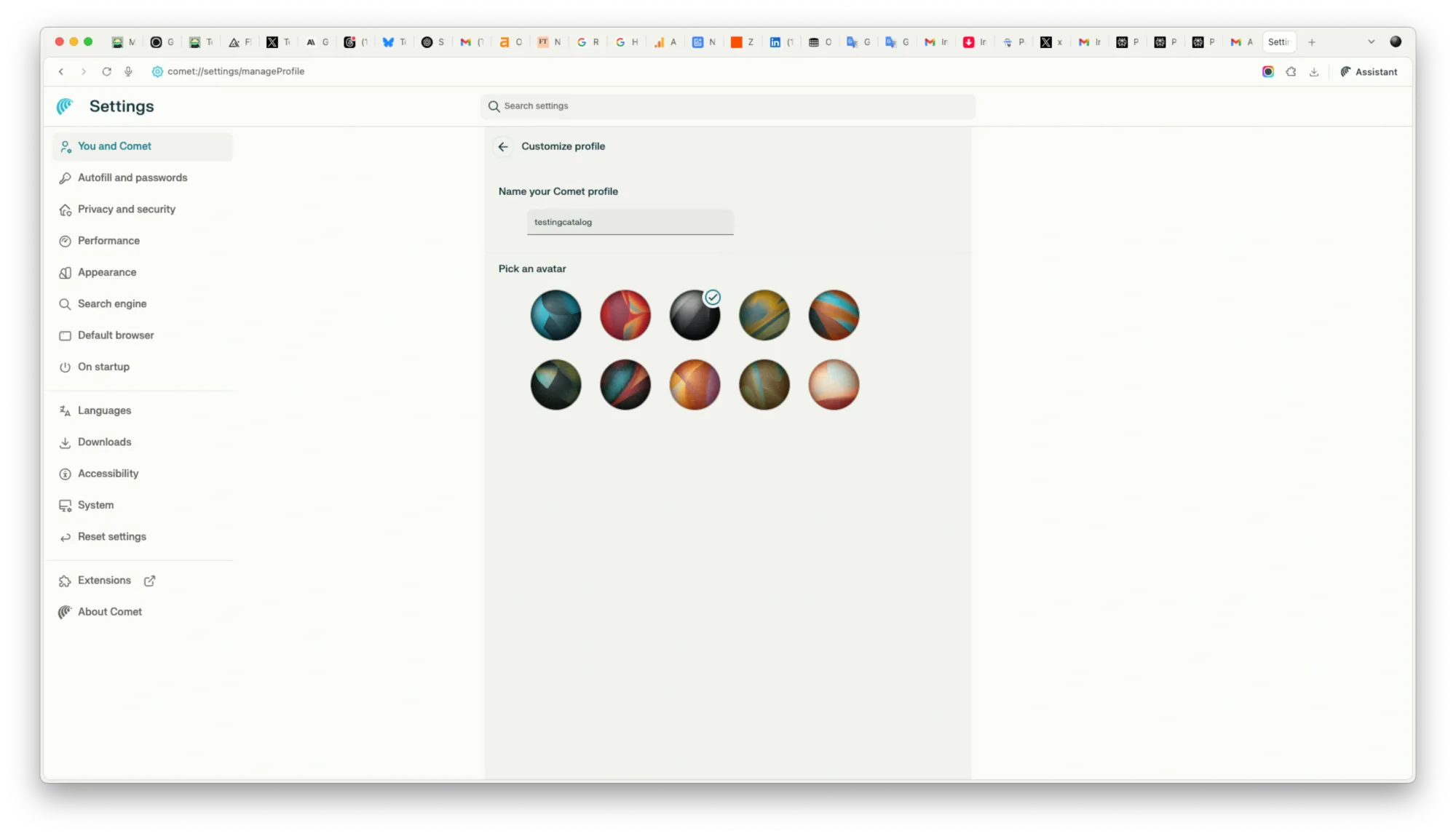
Another important feature is the inclusion of a native ad blocker. Unlike Chrome, whose relationship with ad blocking is increasingly fraught, Comet integrates an open-source solution referenced transparently in the About page. For many, this alone will be a huge reason to make the switch.
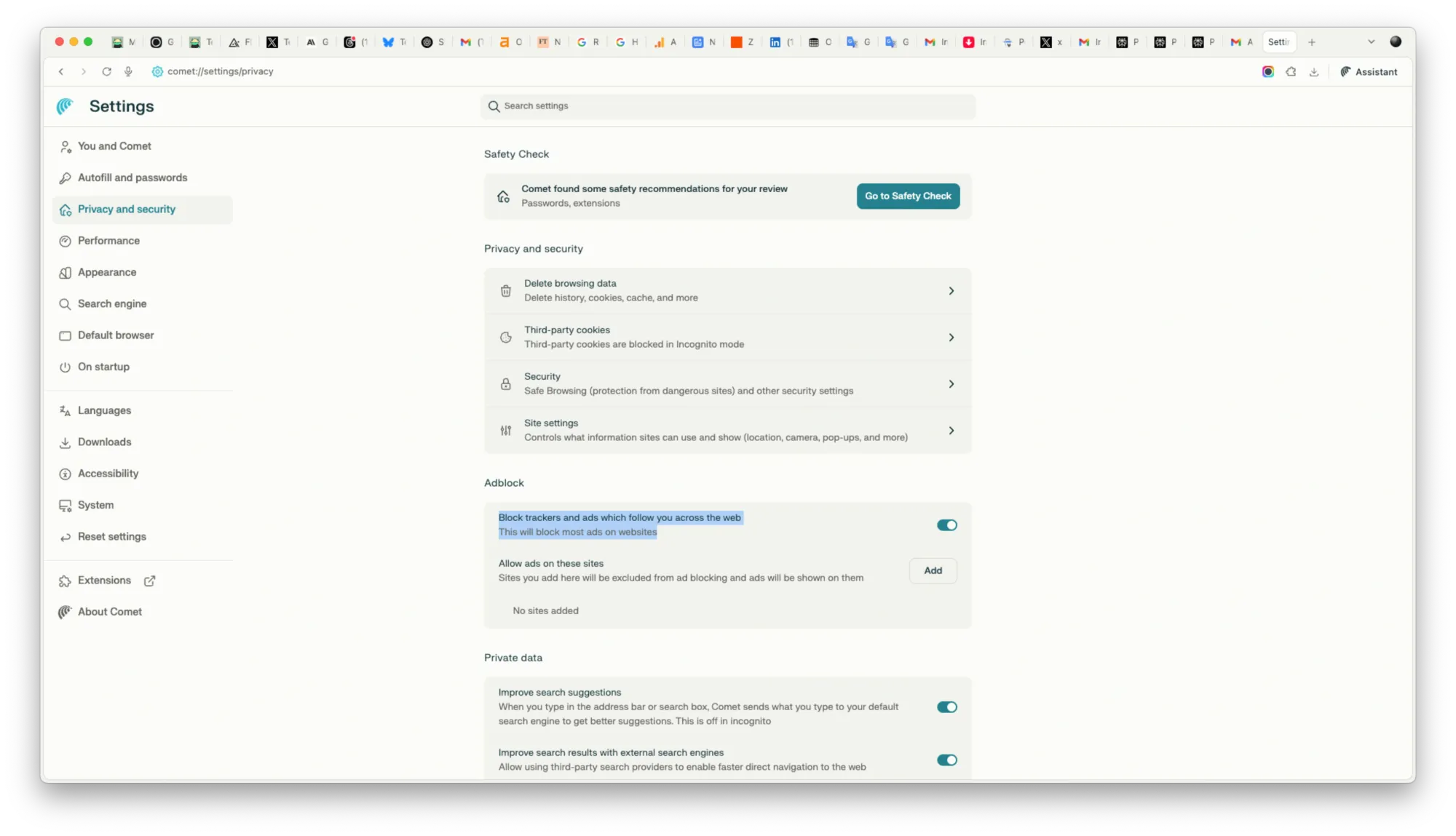
Ask anything
Where Comet truly diverges from typical browsers is in its deep agentic integration. On launch, you’re greeted with a home screen that differs from standard Perplexity: a clean prompt bar, recent tabs, and the ability to initiate agentic tasks directly from the home or URL bar. You can even visit the Perplexity website within Comet and trigger browser-specific actions from there. Prompts aren’t limited to a single location; you can use the sidebar or the home screen, and every Comet thread remains linked to Perplexity itself.
Being able to seamlessly open any YouTube video at a moment when certain things are mentioned is very cool.
— TestingCatalog News 🗞 (@testingcatalog) May 26, 2025
Thanks to @mreflow for featuring me here. I hope we will see his Comet review soon, too! https://t.co/J4RuX63f6E pic.twitter.com/rtu7R5JrQL
Some tasks work best when prompted from certain areas (URL bar, home, sidebar), with Comet smartly differentiating where the command comes from. The result is a multi-entry-point interface for agentic tasks—a novel and flexible way to interact with your browser.
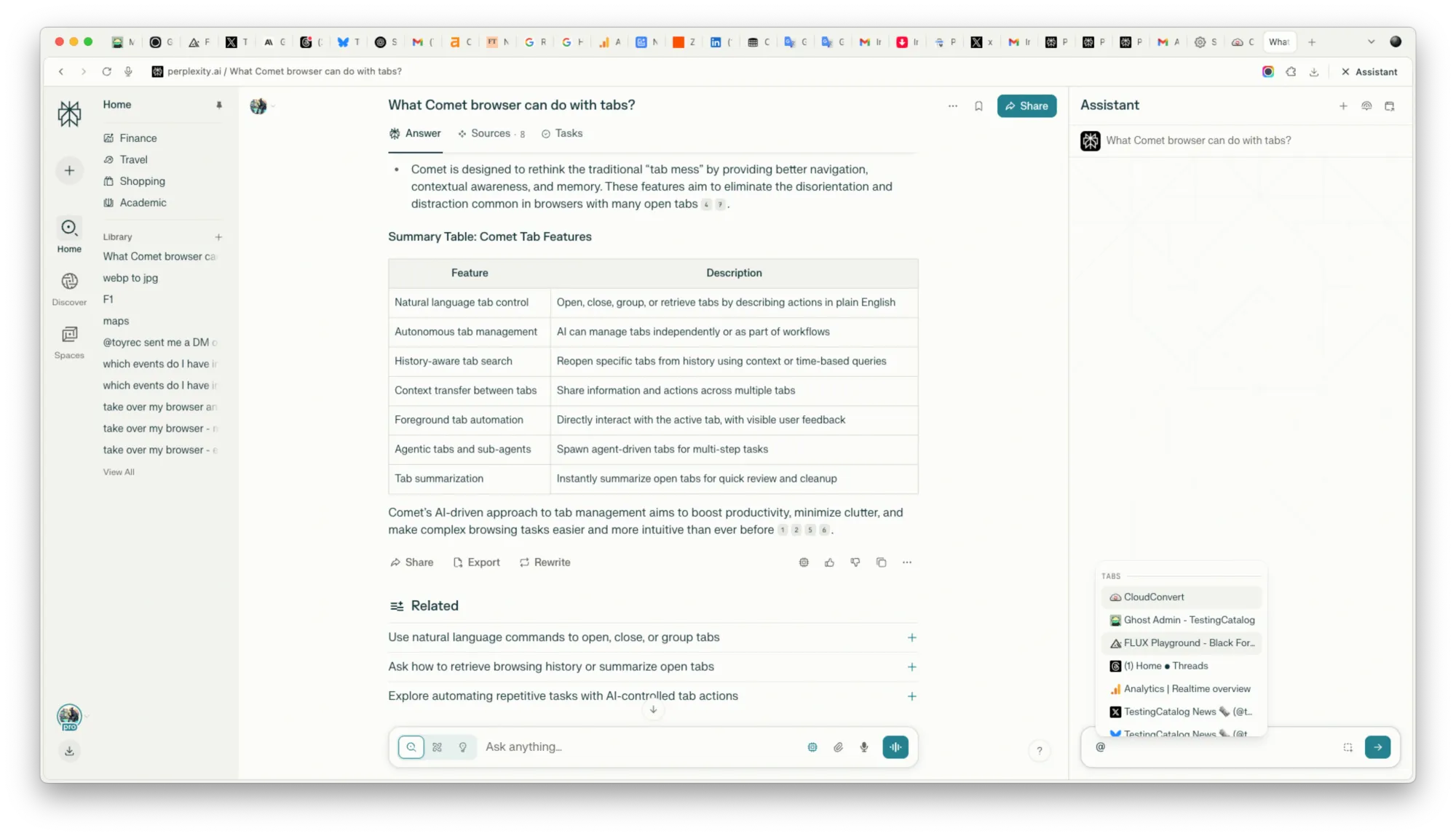
Crucially, Comet has native access to tab management, browsing history, and can natively execute complex browser actions. Need to open dozens of tabs? Just ask. Want to group or close inactive tabs, or clean up duplicates? It’s a simple prompt away. For anyone who’s found themselves overwhelmed by a hundred open tabs, this is a game-changer, browser management shifts from manual to conversational, letting you automate chaos with a sentence.
Sidebar intelligence
Comet’s sidebar, while reminiscent of sidebars found in browsers like Microsoft Edge, brings much more contextual power. The sidebar can see the open page, summarize content, and lets you easily take screenshots. Crucially, it offers seamless access to your Comet threads and conversations, so switching context is effortless.
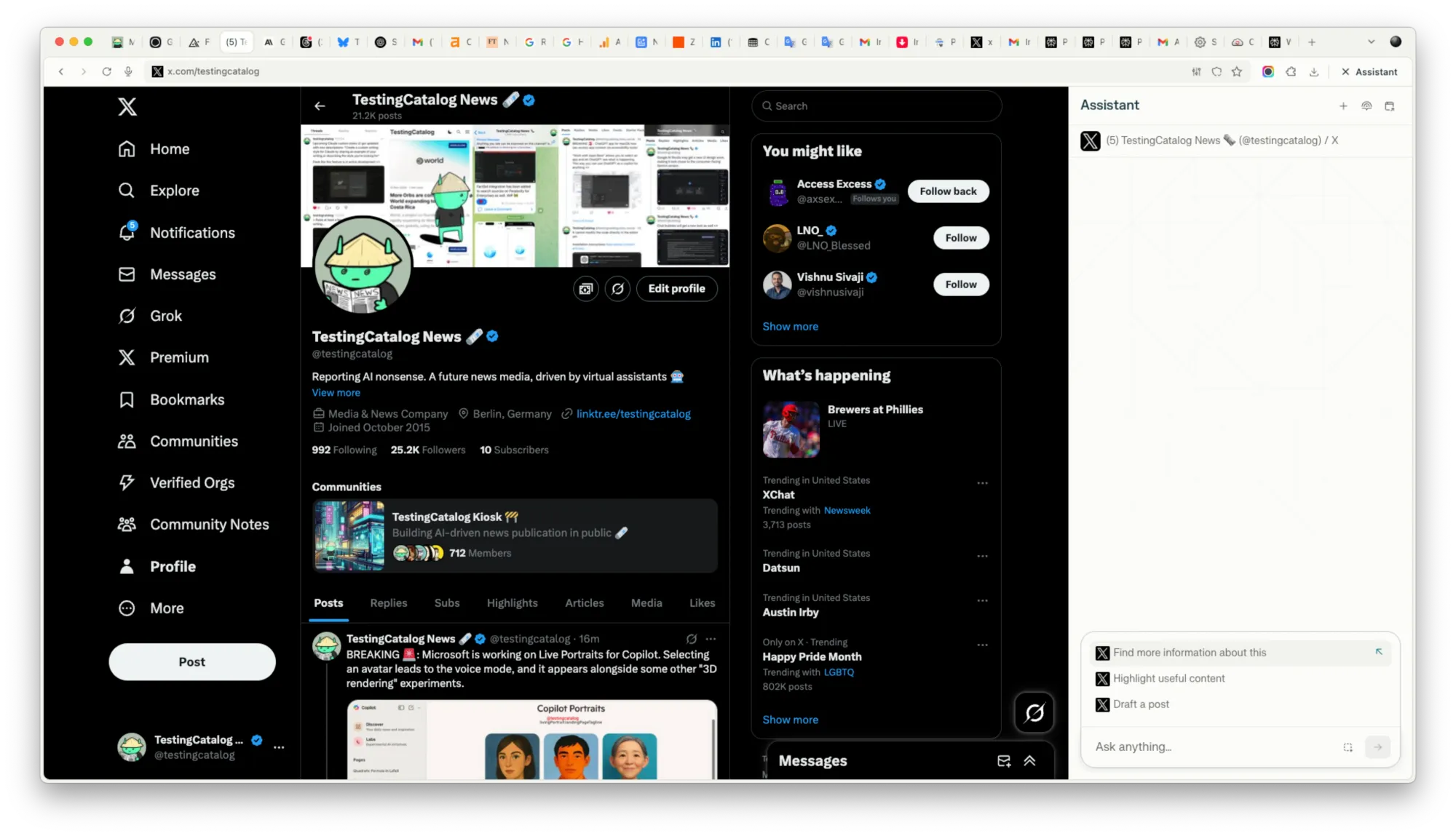
What sets Comet apart here is its dynamic contextual suggestions. Open a profile on X, and Comet will suggest a summary, similar to X’s own Grok AI, but with Perplexity’s twist. It might offer to compose a post, or present other page-specific options. The contextual intelligence makes Comet’s sidebar feel less like an assistant and more like an active collaborator.
Automate web browsing in your way
Comet introduces two automation paradigms: "headed" and "headless" modes.
BREAKING 🚨: Comet Browser can now control an open web page from a sidecar! Now it can simply take it over and click around.
— TestingCatalog News 🗞 (@testingcatalog) May 30, 2025
Making Comet to publish a blog post for me 👀 pic.twitter.com/mKubxeTTFq
Headed Mode lets you watch as Comet takes actions for you, visually showing clicks and form fills. When you prompt Comet to perform a task on a page (e.g., publish a blog post or fill out a form), the browser disables manual interaction on the page, overlays an animation, and walks through the actions step-by-step. You can pause or cancel at any time if something goes wrong, which builds trust in automation. This real-time feedback also makes it easier to refine automation workflows, if a task fails, you see why, and can adjust your prompt accordingly.
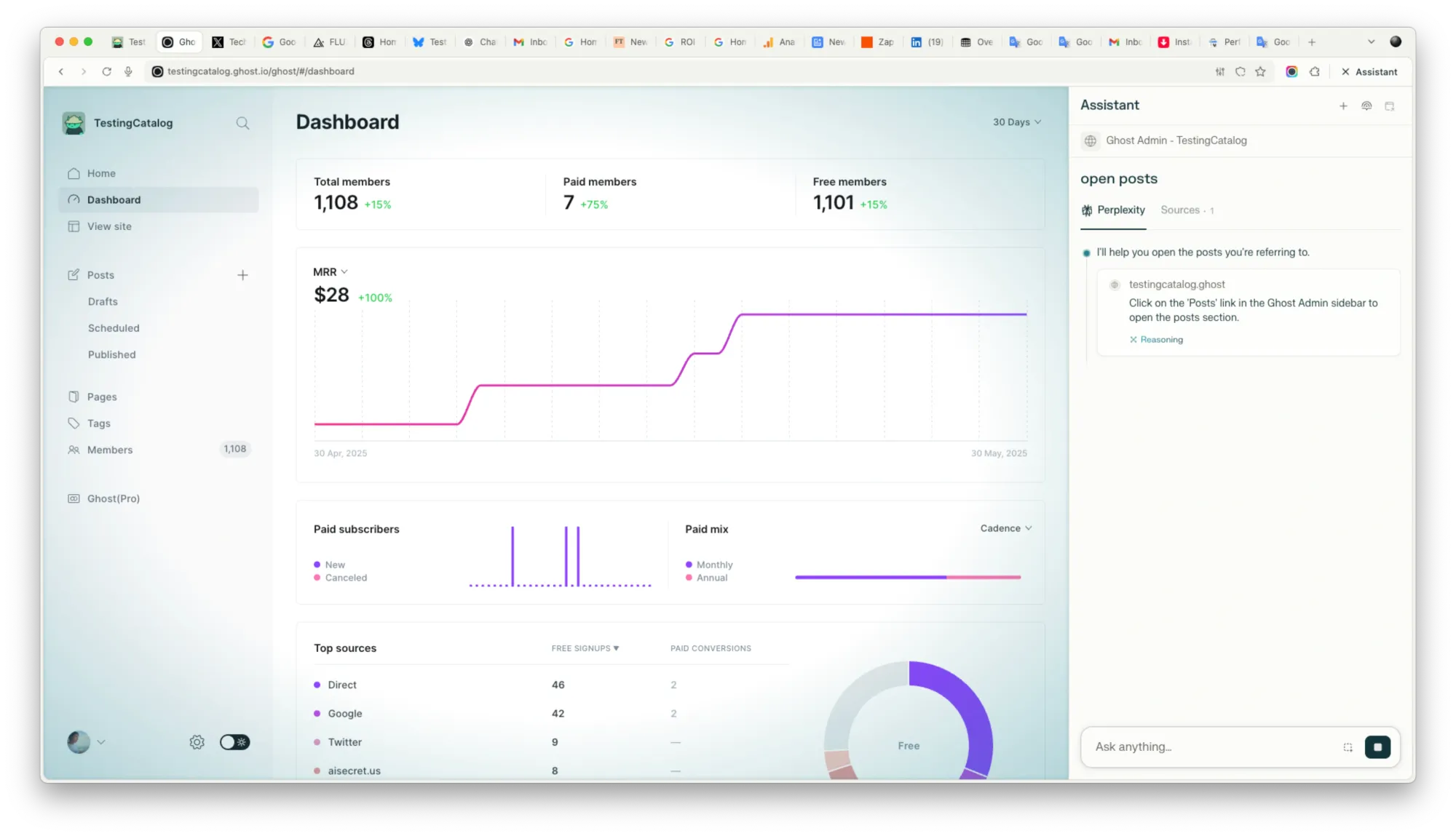
Headless Mode is even more powerful for background automation. Here, Comet spawns multiple sub-agents to carry out tasks in parallel, navigating the web, parsing pages, and making decisions independently of the user interface. When needed (e.g., entering a password or email), agents can pause to request input directly from you. This mode excels at high-level automation: opening and managing social media tabs, posting across multiple accounts, applying for jobs, and more. The only major current limitation is that file uploads from your computer aren’t yet supported, but anything handled via in-page attachments (like “Easy Apply” on LinkedIn) works seamlessly.
Comet browser applying for a job for me 👀
— TestingCatalog News 🗞 (@testingcatalog) May 23, 2025
Soon, you will be able to execute such things on a schedule. pic.twitter.com/wHV0LTV8m9
During testing, we asked Comet to earn money online: It signed up for gigs on Fiverr, found crypto airdrops, and participated in X contests, all initiated from a single prompt. It’s not hard to imagine a future where such agentic browsers perform real economic activities for users, even as new “traps” emerge online to exploit or lure these agents.
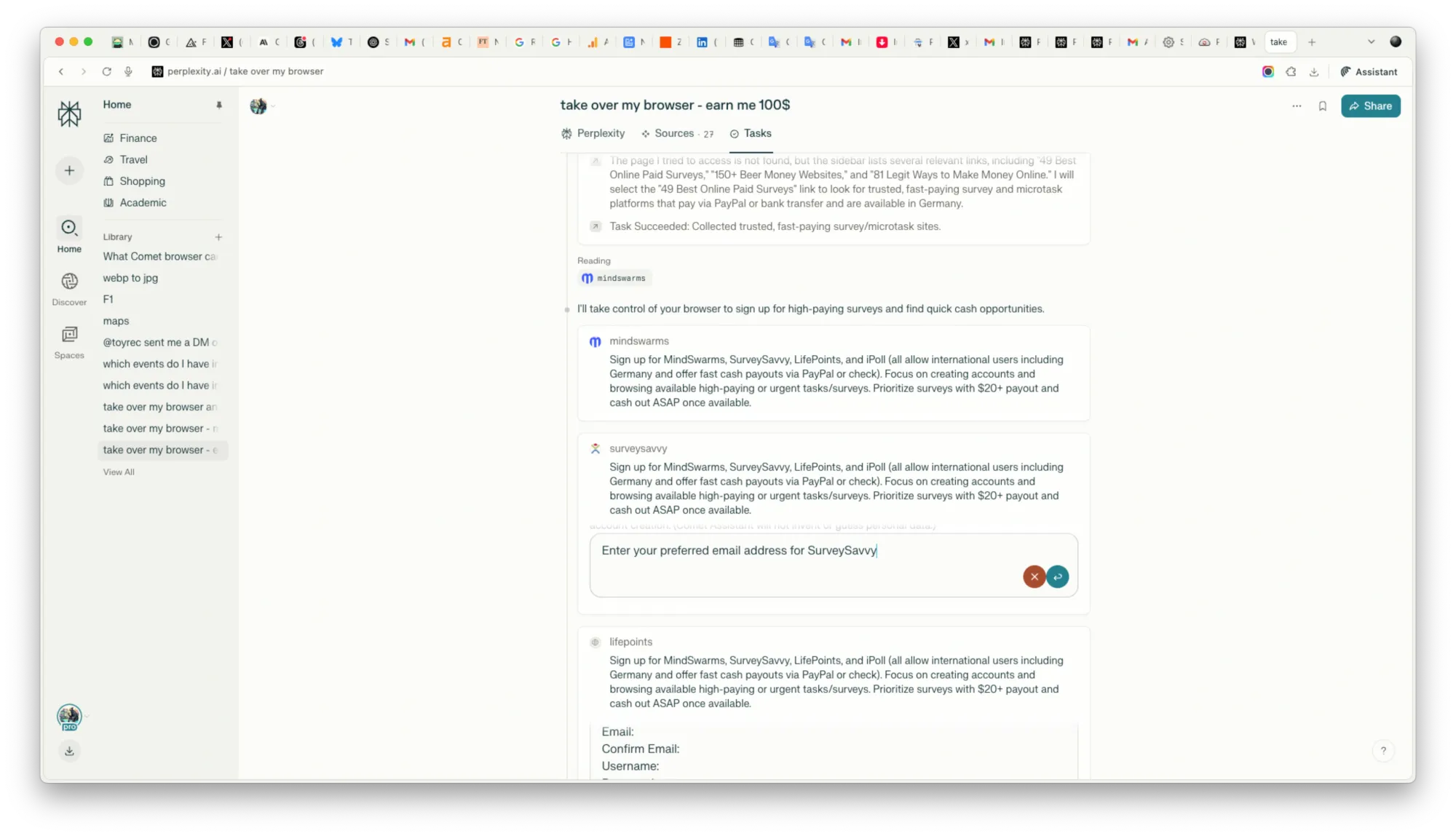
Early Access and future upgrades
Right now, there’s no clear roadmap for how access to Comet will expand; Perplexity has been silent on the rollout. It’s likely the expansion will be gradual, especially since most features are free, even for users on the basic Perplexity tier. Pro subscribers get access to Deep Research, Labs and more advanced queries, but the core agentic features are available to all.
Comet makes Perplexity’s search the default, so the browser works seamlessly with Perplexity’s free or Pro account. Pro adds more advanced search, research, and automation, but even the free experience is robust enough for most tasks.
Looking ahead, Perplexity is developing Scheduled Tasks and Memory features. The latter will let Comet remember your past activities, searches, and context, similar to ChatGPT’s Moonshine or Gemini’s Recall. This will supercharge automation: you’ll be able to schedule agentic tasks to run at intervals, have Comet reference past work, and let it grow into a true personal assistant, one that learns your workflow and habits.
Comet as your personal assistant
A standout upcoming feature is Comet’s planned native integration with Gmail and Google Calendar. This will enable Comet to schedule, reschedule, and delete events; process emails; and weave calendar/email context directly into search and automation. Comet surfaces these actions as native widgets, letting you approve or reject suggestions, and—critically—request further clarification if a suggestion is rejected. This fine-grained control prevents you from having to re-prompt or re-run entire workflows just because a single step wasn’t perfect, a big boost for productivity, especially for those juggling heavy email and calendar loads.
Comet can operate with your Google Calendar and Gmail natively. Create, delete, and modify calendar events and ask for a confirmation in case you reject.
— TestingCatalog News 🗞 (@testingcatalog) May 31, 2025
Your browser will be your best assistant 🤖 pic.twitter.com/9QKCCVzoan
Data privacy and enterprise readiness are still open questions. As with any agentic browser, sharing sensitive data between browser, search, and automation agents could concern enterprise IT. But for individuals and small teams, the productivity leap is obvious.
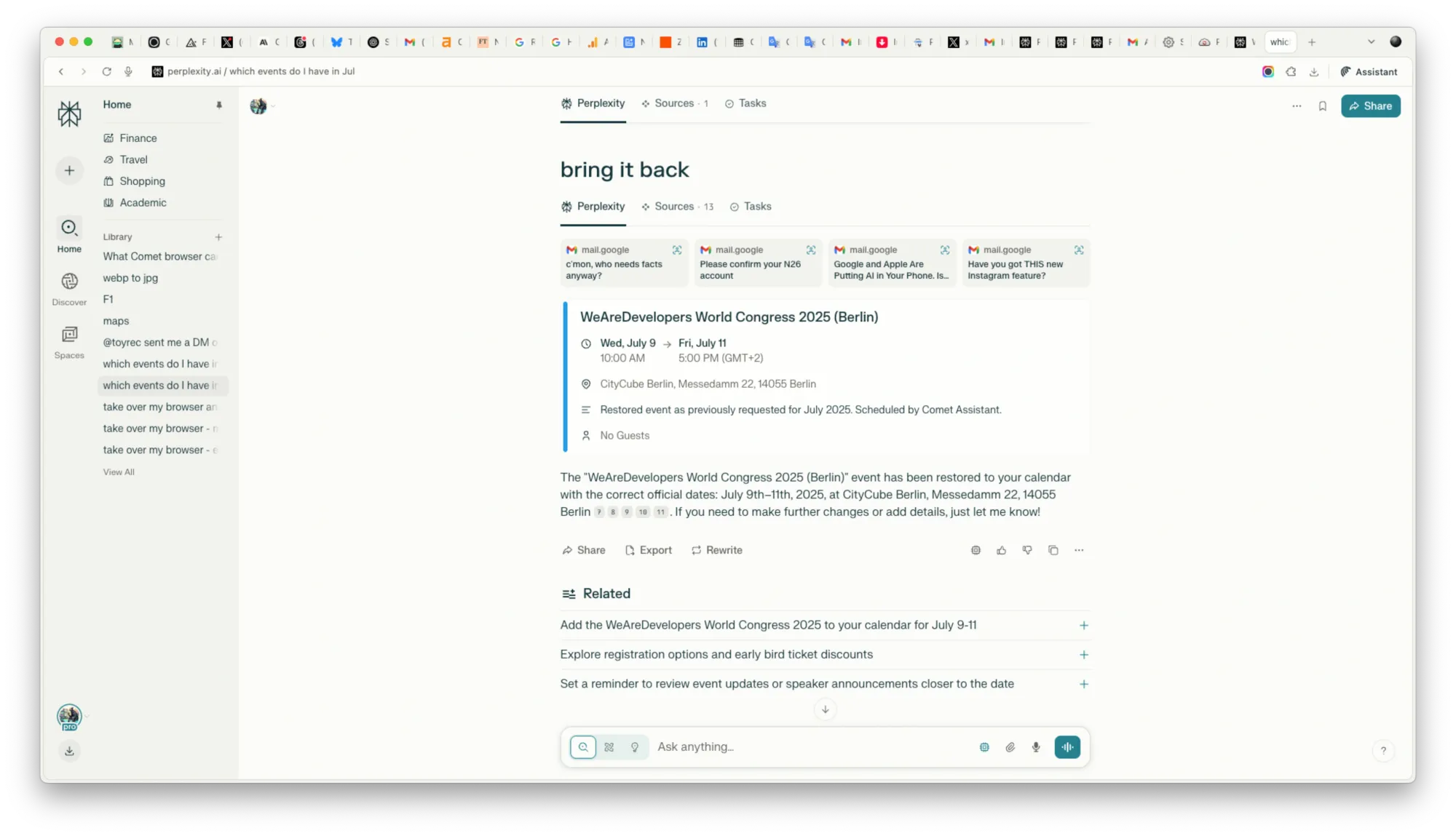
Comet is based on Chromium, so a Windows version is potentially to follow the macOS release (not confirmed yet), potentially putting it ahead of competitors like Dia, which currently targets macOS only. Dia offers some background actions and tab chat features, but it can’t yet perform true agentic actions. By comparison, Comet feels vastly more capable. Google’s Project Mariner is rumored to be targeting similar features, but remains in limited early testing.
Vibe browsing
With Comet, Perplexity isn’t just building another AI assistant or another browser, it’s blending the two into a fundamentally new category: an agentic AI browser that actively works for you (vibe browsing). From tab management and multi-modal prompts to background automation and context-aware widgets, Comet feels two steps ahead of most AI browser experiments on the market today.
vibe browsing pic.twitter.com/c054QJpNpA
— Aravind Srinivas (@AravSrinivas) May 8, 2025
While much remains to be seen regarding access, Windows support, and enterprise adoption, the core feature set is already impressive. For anyone struggling with open tabs, repetitive browser tasks, or just looking for a smarter, more hands-off browsing experience, Comet should be at the top of your watchlist. The agentic browser era is coming, and Comet is leading the way.
